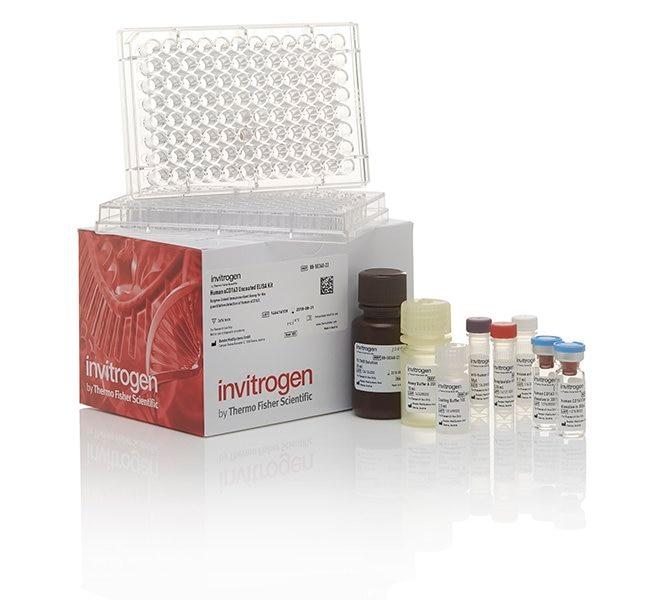Search Thermo Fisher Scientific
Product Specifications
Analytical sensitivity
Assay range
Sample type/volume
Hands-on time
Time-to-result
Homogenous (no wash)
Instrument
Product size
Contents
Detection Antibody: Pre-titrated, HRP-conjugated antibody
Standard: Recombinant protein for generating standard curve and calibrating samples
10X Coating Buffer: Buffer for plating the Capture Antibody
5X ELISA/ELISPOT Diluent: Buffer for blocking and diluting the Detection Antibody and Enzyme
Substrate: 1X TMB Solution
Certificate of Analysis: Lot-specific instructions for dilution of antibodies and standards
96 Well Plate: High affinity 96-well plate (included with product Cat. Nos. ending in suffixes -22, -76, -86)
Shipping conditions
Storage
Protein name
Species (tested)
Assay kit format
Detector antibody conjugate
Label or dye
About This Kit
The Human CCL4 (MIP-1 beta) Uncoated ELISA Kit contains pre-matched antibody pairs, plates and reagents for performing quantitative enzyme linked immunosorbent assays (ELISA) to detect and quantify protein levels of human CCL4 (MIP-1 beta). Wash Buffer and Stop Solution are needed to complete the ELISA reaction and are sold separately.
Principle of the method
ELISAs are designed to measure the amount of the target bound between a matched antibody pair. A target-specific antibody is coated to the bottom of the wells of a microplate, which is an overnight process. Samples, standards, or controls are then added into these wells and bind to the immobilized (capture) antibody. A sandwich is formed by the addition of the second (detector) antibody, a substrate solution is added that reacts with the enzyme-antibody-target complex to produce measurable signal. The intensity of this signal is directly proportional to the concentration of target present in the original specimen.
CCL4 (macrophage inflammatory protein 1-beta, MIP1B) belongs to the intercrine beta (chemokine CC) family. Functionally, CCL4 is involved in chemotactic and proinflammatory effects, and homeostasis. CCL4 is produced by macrophages upon stimulation by bacterial endotoxins. CCL4 recruits and stimulates various inflammatory cells at sites of inflammation. CCL4 is produced by lymphocytes, macrophages and dendritic cells. Both CCL4 and the related protein CCL3 participate in the host response to invading bacterial, viral, parasite and fungal pathogens by regulating the trafficking and activation state of selected subgroups of inflammatory cells. While both CCL4 and CCL3 exert similar effects on monocytes, their effect on lymphocytes differ, with CCL4 selectively attracting CD4+ lymphocytes and CCL3 selectively attracting CD8+ lymphocytes. Additionally, both have been shown to be potent chemoattractants for B cells, eosinophils and dendritic cells. The processed form of CCL4 can induce down-modulation of surface expression of the chemokine receptor CCR5, thus inhibiting the CCR5-mediated entry of HIV-1 in T cells. CCL4 binds with high affinity to CCR5 receptors.
For Research Use Only. Not for use in diagnostic procedures. Not for resale without express authorization.
References (0)
Bioinformatics
Gene aliases : ACT2, AT744.1, CCL4, G-26, HC21, LAG-1, LAG1, MIP-1-beta, MIP1B, MIP1B1, SCYA2, SCYA4
Gene ID : (Human) 6351
Gene symbol : CCL4
Protein Aliases : ACT-2, C-C motif chemokine 4, chemokine (C-C motif) ligand 4, G-26 T-lymphocyte-secreted protein, HC21, LAG-1, Lymphocyte activation gene 1 protein, Macrophage inflammatory protein 1-beta, MIP-1-beta, MIP-1-beta(1-69), PAT 744, Protein H400, secreted protein G-26, SIS-gamma, small inducible cytokine A4 (homologous to mouse Mip-1b), Small-inducible cytokine A4, T-cell activation protein 2
UniProt ID (Human) P13236

Performance Guarantee
If an Invitrogen™ antibody doesn't perform as described on our website or datasheet,we'll replace the product at no cost to you, or provide you with a credit for a future purchase.*
Learn more
We're here to help
Get expert recommendations for common problems or connect directly with an on staff expert for technical assistance related to applications, equipment and general product use.
Contact tech support

